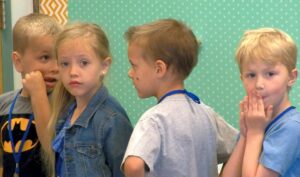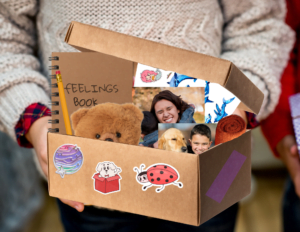Last week, we talked about how important sleep is to health and learning for kids (and adults, too) and how having a sleep routine can help to ensure that kids get enough and high-quality sleep. We shared tips on how parents can come up with a sleep routine for kids.
By now you perhaps have decided when you are going to get started with your new plan, where and when to dock your devices, and which relaxation strategies you are going to try first. How do you get the kids to start that routine?
Pre-teach the plan
One of the best ways to get your kids to start a new routine or habit is to pre-teach your kids what you want them to do and how to do it.
These pre-teaching techniques can help set your family up for success. You know your children best and will know what is most likely to help them get on board with a new sleeping routine. You may try something like, “Tonight we are going to start working on getting a good night’s sleep. Did you know that your brain grows while you’re sleeping? So, at 6:30 we’re going to put on pajamas and brush your teeth. When you are all ready, we can read (listen to a meditation/muscle relaxation/sleepy time breaths/etc.) until 7:30. Then lights out!”
It can help kids to remember the steps to their sleep routine if you write the steps down and put the list where your kids will be able to see it while they are doing the routine (like on their bedroom door or the bathroom mirror). If you child isn’t reading by themselves yet, you can use some pictures to help remind them or let them draw the pictures so that they feel a sense of ownership. If you have chosen some ways that you think might help your child fall asleep, you could put a list of those techniques somewhere where your child can see it from their bed.
Reinforce kids when they follow the routine
We have talked in a few blogs about how to reinforce children’s behaviors. Because getting used to a new routine can be hard for kids, this is a time when reinforcement can be really helpful and keep kids motivated until the routine becomes an established habit. Tell your kids when they are following the routine. Congratulate them on remembering the steps. “I noticed that you stopped watching tv at eight o’clock and went right to brush your teeth. Way to remember your routine!”
You may also want to use a tangible reward. You could create a sticker chart. Each evening that your child completes their routine by themselves (without more than one reminder, let’s say, because they might need reminders at first) they could earn a sticker. When your child has earned a certain number of stickers, they could get a bigger reward. Maybe your child could choose the dessert one night or a television show. Or earn a little extra screen time. The best rewards are things that will motivate your child but that will not be difficult for you to provide.
It’s also important to remember that when kids (or anyone) are learning a routine, they will not be perfect at first. So you may need to remind them what the steps are. And if they don’t earn a sticker one night, you can just say, “That’s okay. You can try again tomorrow night. I know that you are going to get this.” This teaches your child that is it okay not to be perfect and that you know that they can learn new things.
Everyone learns best when they know what to do and someone tells them when they are doing things right! Try practicing the new sleep routine with your kids this week. Next week, we will explore what to do when your child can’t fall asleep. Stay tuned!
[divider type=”standard” text=”Go to top” full_width=”no” width=”1/1″ el_position=”first last”]
Text: © Kids In Transition to School 2021
Image: © Wave Break Media Ltd | Dreamstime.com





